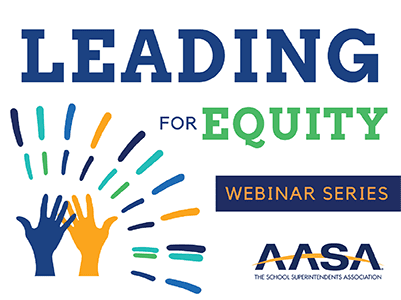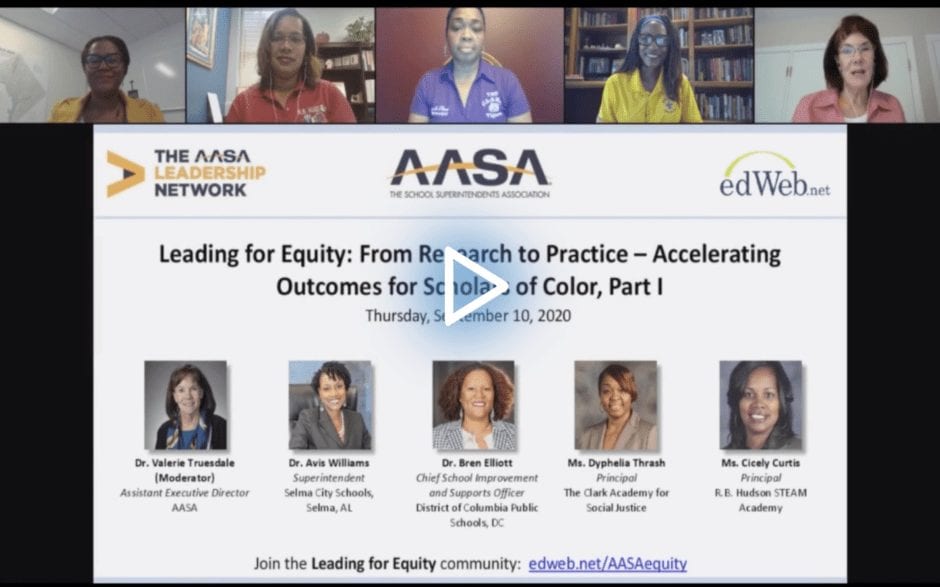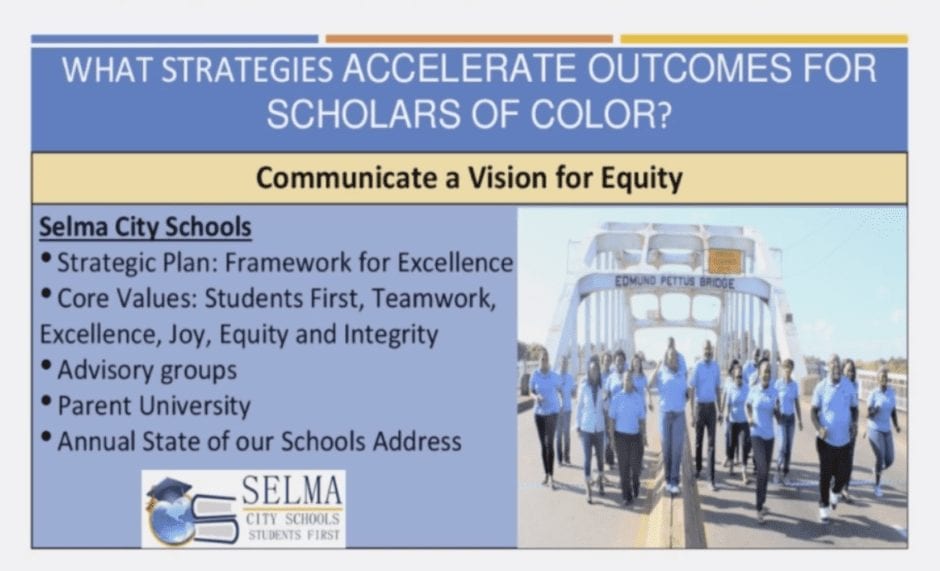Pursuing Educational Equity in Selma: Part 1
By Stacey Pusey
Achieving educational equity is a moral and fiscal imperative, according to Dr. Bren Elliott, Chief School Improvement and Supports Officer for District of Columbia Public Schools. Moral because all students deserve access to the same high-quality education and opportunities, and fiscal because research shows the negative economic impact when students are left behind. In the edWebinar, “Leading for Equity: From Research to Practice – Accelerating Outcomes for Scholars of Color, Part I,” hosted by AASA, The Superintendents Association and AASA’s Leadership Network, the leaders from Selma City Public Schools in Alabama shared the first part of their plan and how it ties into Dr. Elliott’s research on successful strategies for achieving educational equity.
Strategy 1: Communicate a Vision for Equity
First, said Dr. Elliott, schools need to define equity and share that vision with their whole community. They need to call out where gaps exist, describe their intentional plans for closing those gaps, and how they’ll measure and monitor progress. Most important is to explain the why so the district gets community buy-in.
In Selma, equity became a part of the district’s strategic plan, and they defined the core values guiding their initiative:
- Students First – determine how every step will impact the children
- Teamwork – every step must be done collectively and collaboratively
- Excellence – every member must focus on doing their best work
- Joy – they need to remember to celebrate each other and their successes
- Equity – make sure they are removing barriers so that all truly means all
- Integrity – don’t cut any corners; do things the right way
In addition, they have advisory groups at every level—parents, students, and teachers—as well as a Parent University program where the staff go out to the parents and makes sure the parents’ needs are being met. However, said Dr. Avis Williams, Superintendent of Selma City Public Schools, every initiative is filtered through that core value of Students First.
At The Clark Academy for Social Justice, that vision for equity is communicated daily. Every morning, students recite the Social Justice Academy Pledge. Dyphelia Thrash, Principal of The Clark Academy for Social Justice, said reciting the pledge lets students show they are proud of this community and is part of the school’s plan to have students better understand their community’s history.
Strategy 2: Establish a Culture of High Expectations
In this second step, said Dr. Elliott, it’s vital that all students are taught to grade-level expectations and schools work to get rid of factors that create bias in the system. Often, this includes students and family contracts listing roles and responsibilities for the school, parents, and students. At Selma, this strategy is exemplified by two different programs. A+ College Ready, for example, is an intense summer professional learning program that ensures teachers are prepared to teach rigorous work to all students. Next, they have rethought the gifted programs. Instead of only select students receiving additional instruction, they have moved to an enrichment model where the gifted teachers support the classroom teachers, infusing rigorous content in regular classes so more students receive access.
This expectation reaches beyond the classroom to community involvement at The Clark Academy. Every student is required to participate in community projects, and in fourth and fifth grade, the students develop capstone projects that help fill a community need.
Strategy 3: Implement Strategies to Meet the Needs of All Students
Instead of thinking in terms of all students, said Dr. Elliott, think about how to target needs of individual groups and students. Schools will need specific strategies for historically marginalized populations because previous initiatives have not worked. Selma hosts Lunch & Learn events for students to ask them about their hopes and dreams and what they need, and they also have Chat & Chews with parents to check in on them.
R.B. Hudson STEAM Academy staff manifests this strategy with STEAM Fridays. Every Friday, students choose three different two-hour sessions based on their individual interests; the class topics come from student polls asking what the kids want to learn. One of the most popular, for instance, is Fashion Design & Natural Hair Care, where students learn how to design and make clothing. Cicely Curtis, Principal of R.B. Hudson, said an important aspect of STEAM Fridays is community involvement. Community members come and help with the special-interest classes, making them invested in the success of the program.
Overall, every part of the Selma plan is intentional and embraced by all administrators, staff, and teachers. Dr. Elliott said that’s essential—equity work is adaptive work, meaning while schools implement practices and procedures, there also needs to be mindset shifts throughout the school community in order to make effective changes.
Read the article on Part II of this edWebinar here.
This edWeb broadcast was hosted by AASA, The Superintendents Association and AASA’s Leadership Network, providing premier professional learning for educational leaders.
About the Presenters
Dr. Avis Williams is Superintendent of Selma City Schools where there are stated goals for Equity and Joy in preparing the Whole Child. Dr. Williams served in leadership positions in the U.S. Army, as an entrepreneur and school administrator. As Executive Director of Instruction in North Carolina, she led instruction for over 60 schools. Before moving to Selma, she served as the assistant superintendent for curriculum in Tuscaloosa City Schools. Dr. Williams was awarded the Marbury Technology Innovation Award by the Alabama State Department of Education in 2011 as a principal and in 2019 as the superintendent. A finalist for Alabama State Superintendent of the Year in 2019, Dr. Avis Williams is humbled and honored to be a part of the Historic Selma community and to serve as Superintendent of Selma City Schools.
Dr. Bren Elliott has a 25-year proven track record of significantly impacting academic achievement and stakeholder engagement in public education. She has worked as a teacher, principal, assistant superintendent, and now as Chief Improvement and Supports Officer for District of Columbia Public Schools (DCPS) in Washington, DC. Dr. Elliott is a reflective practitioner who previously served as Chief Equity Officer for DCPS, overseeing leader professional development, student support systems, and the staff evaluation system. Dr. Elliott is a passionate scholar and practitioner regarding school culture, social-emotional learning, and equity initiatives.
Ms. Cicely Curtis is Principal of R.B. Hudson STEAM Academy. Ms. Curtis leads her students and staff to develop scholars’ critical thinking skills through rigorous and relevant content in order to maximize their potential in a global society.
Ms. Dyphelia Thrash is Principal of The Clark Academy for Social Justice. Ms. Thrash leads her school community to make every effort to foster academic excellence through intellectual, creative, and differential instructional methods.
About the Host
Dr. Valerie Truesdale joined AASA early in 2019 as Assistant Executive Director. She is responsible for guiding leadership development services and programs. With years of experience as an educational leader in roles of superintendent, chief transformation and technology officer, principal and teacher, she knows that AASA’s Leadership Network can be a substantial resource for school leaders trying to keep pace with the rapidly changing delivery of K-12 education.
Join the Community
Leading for Equity is a free professional learning community on edWeb.net for school and district leaders who face many challenges leading schools and driving school improvement for all students, especially now with COVID-19.
The AASA Leadership Network drives superintendent success, innovation and growth, shaping the future of public education while preparing students for what’s next. We are the largest, most diverse network of superintendents in America. Passionate and committed, we connect educational leaders to the professional learning, leadership development, relationships and partnerships they need to ensure a long career of impact.
Stacey Pusey is an education communications consultant and writer. She assists education organizations with content strategy and teaches writing at the college level. Stacey has worked in the preK-12 education world for 20 years, spending time on school management and working for education associations including the AAP PreK-12 Learning Group. Stacey is working with edWeb.net as a marketing communications advisor and writer.







Comments are closed.